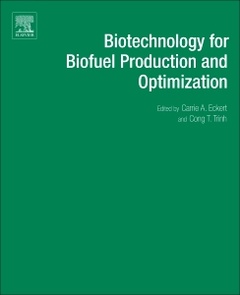Biotechnology for Biofuel Production and Optimization

Biotechnology for Biofuel Production and Optimizationis thecompilation of current research findings that cover the entire process of biofuels production from manipulation of genes and pathways to organisms and renewable feedstocks for efficient biofuel production as well as different cultivation techniques and process scale-up considerations. This book captures recent breakthroughs in the interdisciplinary areas of systems and synthetic biology, metabolic engineering, and bioprocess engineering for renewable, cleaner sources of energy.
1. Engineering Central Metabolism for Production of Higher Alcohol-based Biofuels 2. Secondary Metabolism for Isoprenoid-based Biofuels 3. Metabolic Engineering for Fatty Acid and Biodiesel Production 4. Pathway and Strain Design for Biofuels Production 5. RNA-Based Molecular Sensors for Biosynthetic Pathway Design, Evolution, and Optimization 6. Pathway Assembly and Optimization 7. Design of Dynamic Pathways 8. Applications of Constraint-Based Models for Biochemical Production 9. Biotechnological Strategies for Advanced Biofuel Production: Enhancing Tolerance Phenotypes Through Genome-Scale Modifications 10. Evolutionary Methods for Improving the Production of Biorenewable Fuels and Chemicals 11. Biomass Utilization 12. Ralstonia eutropha H16 as a Platform for the Production of Biofuels, Biodegradable Plastics, and Fine Chemicals from Diverse Carbon Resources 13. Methane Biocatalysis: Selecting the Right Microbe 14. Photosynthetic Platform Strain Selection: Strain Selection Considerations and Large-Scale Production Limitations 15. Interpreting and Designing Microbial Communities for Bioprocess Applications, from Components to Interactions to Emergent Properties 16. Cell-Free Biotechnologies 17. Microbial Electrochemical Cells and Biorefinery Energy Efficiency 18. Photobiohybrid Solar Conversion with Metalloenzymes and Photosynthetic Reaction Centers 19. Scale-Up—Bioreactor Design and Culture Optimization 20. Scale-Up Considerations for Biofuels
Primary Market (who is the user? Who will buy the book? eg chemical engineers:user, library:buyer)
This book will appeal not only to scientists (i.e., biochemists, molecular biologists, chemists, and microbiologists) working to understand the fundamental problems associated with biomass conversion research, but also chemical and mechanical engineers working to design new conversion processes for advanced biofuels.
Secondary Market (who is the user? Who will buy the book?)
A secondary market will be DOE and another government staff looking for expert advice in the field of Biofuels production. For example: See "BP Biofuels chief calls biofuels "the new oil" as Advanced Biofuels Leadership Conference opens," Jim Lane, Biofuels Digest, April 22, 2010. "Oil Companies See Profits in Advanced Biofuels," Emily Gertz, BioFuels Energy, May 28, 2009. "Department of Energy Highlights New Advanced Biofuels Research and Development Facility at Lawrence Berkeley National Laboratory," U.S. DOE EERE, Biomass Program: News, Aug 19, 2011.
Cong T. Trinh, PhD., is a Professor of Chemical and Biomolecular Engineering at the University of Tennessee Knoxville (UTK). Trinh received his B.S. in Chemical Engineering (with summa cum laude, honors thesis) at the University of Houston and earned his Ph.D. in Chemical Engineering at the University of Minnesota, Twin Cities. To continue his interests in biofuels research, he has worked at the Energy Biosciences Institute, University of California, Berkeley as a postdoctoral scholar. At UTK, his research interests focus on understanding and engineering cellular metabolism with the ultimate goal to design, construct, and chara
- Describes state-of-the-art engineering of metabolic pathways for the production of a variety of fuel molecules
- Discusses recent advances in synthetic biology and metabolic engineering for rational design, construction, evaluation of novel pathways and cell chassis
- Covers genome engineering technologies to address complex biofuel-tolerant phenotypes for enhanced biofuel production in engineered chassis
- Presents the use of novel microorganisms and expanded substrate utilization strategies for production of targeted fuel molecules
- Explores biohybrid methods for harvesting bioenergy
- Discusses bioreactor design and optimization of scale-up
Date de parution : 01-2016
Ouvrage de 572 p.
19x23.3 cm
Thèmes de Biotechnology for Biofuel Production and Optimization :
Mots-clés :
biomass conversion; metabolic engineering; biofuels; enzymatic catalysis; catalysis



